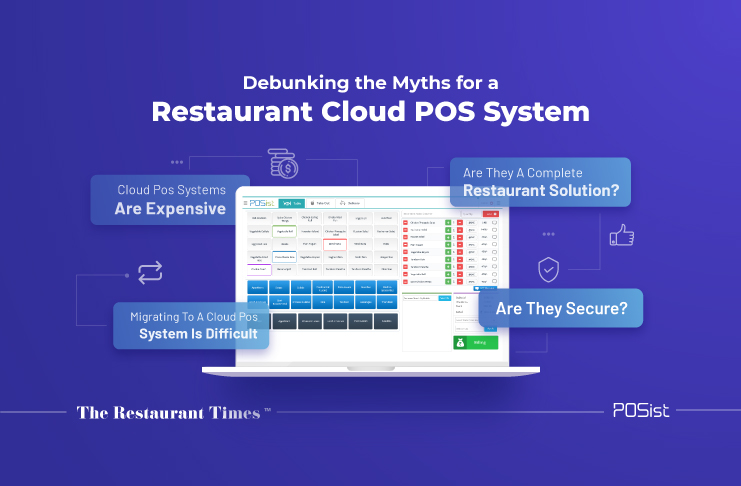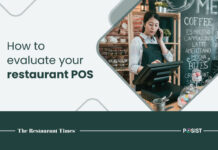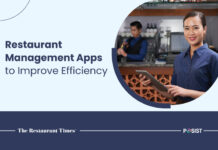Cloud computing has found applications in different business verticals, including the restaurant industry. According to a Cloud Computing survey, more than 73% of organizations reported having ported a business application or a portion of their computing infrastructure to the cloud. Still, many restaurateurs have misconceptions about cloud computing services and restaurant cloud POS systems. These myths prevent some restaurant operators from moving to the Cloud-based POS systems and leverage one of the most robust and intuitive solutions that have the potential to streamline their operations like never before.
Debunking The Misconceptions Of The Restaurant Cloud POS System
In spite of the many benefits of Restaurant Cloud POS systems, restaurateurs doubt the credibility of cloud POS systems and hesitate to switch from traditional POS systems. Let’s address some common myths and misconceptions about switching to a cloud-based Restaurant POS system.
Myth 1: Migrating The Restaurant Data From Legacy POS Systems To Cloud-Based Systems Will Be Difficult And Consume A Lot Of Time
Considering the time taken to migrate the entire data from local servers, along with the risk of losing important business information, switching to a new management software seems a daunting task for restaurateurs. Contrary to the Traditional POS – systems that take a few days’ time to be implemented- a Cloud-Based Restaurant POS system takes only a day to become entirely functional. Integrating all the menus of your restaurant takes only about 2 hours with cloud-based restaurant software. One of the most common misconceptions is the risk associated with losing data during POS migration. A robust restaurant cloud POS system is capable of retaining all the previous restaurant data since it is stored online. A restaurant cloud POS system has an intricate architecture, but its user-friendly interface requires no specialized training.
Myth 2: Restaurant Cloud POS Systems Are Expensive
Cloud POS systems are considerably cheaper than the legacy POS systems. Legacy POS systems require bulky hardware such as costly on-site servers that require timely maintenance. On the other hand, cloud-based POS systems decrease the upfront costs as no expensive servers are needed. It comes with one upfront cost – the subscription fee- which varies according to the specific needs of the restaurant. Since everything is stored online, there are no hidden charges or expenses involved in re-installing the system.
The cost of buying and maintaining expensive computer equipment and data storage devices is negligible compared to cloud POS systems. Implementing cloud-based restaurant management software eliminates any scope of error across the entire restaurant operations. They come with 24*7 support and have lower operating costs in the longer run.
Myth 3: Cloud-Based Restaurant POS Systems Do Not Guarantee Complete Security Over Data
There’s an abundance of information relating to a restaurant’s day to day operations, which is vulnerable to security risks. A common concern of restaurant operators is whether their data is secure on SaaS applications. They feel that it is safer to store data on physical servers as the location is known. In fact, Cloud POS systems ensure that onboard data is backed-up with multiple redundancy features, providing restaurants reliable and responsive access. These systems encrypt database information on both front and backend levels, leaving no risk of data breach. A smart cloud-based POS solution allows the designating of specific user rights to key stakeholders and employees so that only authorized personnel can access the information on the system, with adequate firewalls to protect the restaurant data.
Myth 4: The Restaurant’s Operations Will Lag When The Software Updates In The Cloud POS System
Cloud software has a larger bandwidth that ensures a smooth flow of services, without any lagging issues during the restaurant’s operations. When new features or software versions are made available, the cloud-based POS updates automatically. Cloud POS systems require software updates only to the central system. The updated software reflects automatically in all the other handheld devices. There is no issue of data loss, downtime, or delays ensuring a smooth workflow.
Myth 5: There Is No Data Integrity With A Cloud-based POS In Case Of Internet Failure
Cloud POS systems work on any web-enabled device. Since the entire data is stored over Cloud in a restaurant cloud POS system, restaurateurs fear the risk of losing data and the inability to take orders, in case of network issues or internet failures. On the contrary, Cloud POS systems can detect connectivity issues and work efficiently in offline mode, if required. In the case of internet outage issues, the billing operations are not hampered, and the restaurant staff can process orders and punch bills in the offline medium.
On regaining internet connectivity, all the data from the offline transactions, such as the total number of items sold, the number of bills punched, etc, automatically get synced in the system. The feature of offline reporting and offline sync ensures the smooth functioning of the restaurant’s operations. Using a Cloud-based POS system has a competitive advantage over legacy POS systems as it makes the process of data backup easy.
Myth 6: Cloud Restaurant POS Does Not Support The Functioning Of Large Chain Restaurants
Large restaurants chains operating in multiple outlets across different parts of the globe have different sets of requirements and need to adapt quickly, according to the evolving customer dynamics. A common misconception is that POS systems are not suitable for large restaurants. However, this is incorrect. One of the best features in a restaurant cloud POS system is that it syncs multiple devices, networking numerous terminals on an intermediate level. The entire restaurant information from different locations and systems is thus accessible on a single database. With a single click, business operators can analyze the restaurant information from anywhere, and perform standardized upgrades centrally. The changes or updates reflect automatically across the entire ecosystem- the POS terminals, handheld devices, website/ mobile apps, and integrated platforms. A robust cloud-based restaurant POS system supports scalability and has the sheer ability to accommodate and streamline the entire functioning of the restaurant.
Myth 7: The Cloud POS System Does Not Provide A Complete Restaurant Solution
One of the biggest misconceptions of cloud-based POS systems is that of not providing complete control over the business operations. A restaurant cloud POS system is, in reality, is a full restaurant management system that controls different functions of the restaurant business from one place. It is designed with advanced automated features for managing daily restaurant functions such as Billing, CRM, Staff Management, Inventory Control, Centralized Menu Management, Vendor Management, Recipe Management, Wastage Management, etc.
The architecture of modern POS systems is well integrated with mobile features. It can seamlessly connect with ordering systems, kiosks, guest-facing apps, kitchen display hardware along with any third-party modules related to food delivery, accounting, customer loyalty programs, and other functions. The comprehensive features and architecture of the cloud-based POS system clearly distinguish it from the traditional structure of legacy POS, making it the right choice for the restaurateurs.
Cloud Computing is the future of businesses. Cloud-Based Restaurant POS software is one of the most intensive systems specifically designed to simplify restaurant operations and take your restaurant businesses to the next level. Now that we have debunked the misconceptions related to the restaurant cloud POS system, it is the right time to make the switch. If you have any queries related to the Cloud-based Point of Sale Software, feel free to Contact Us!


















